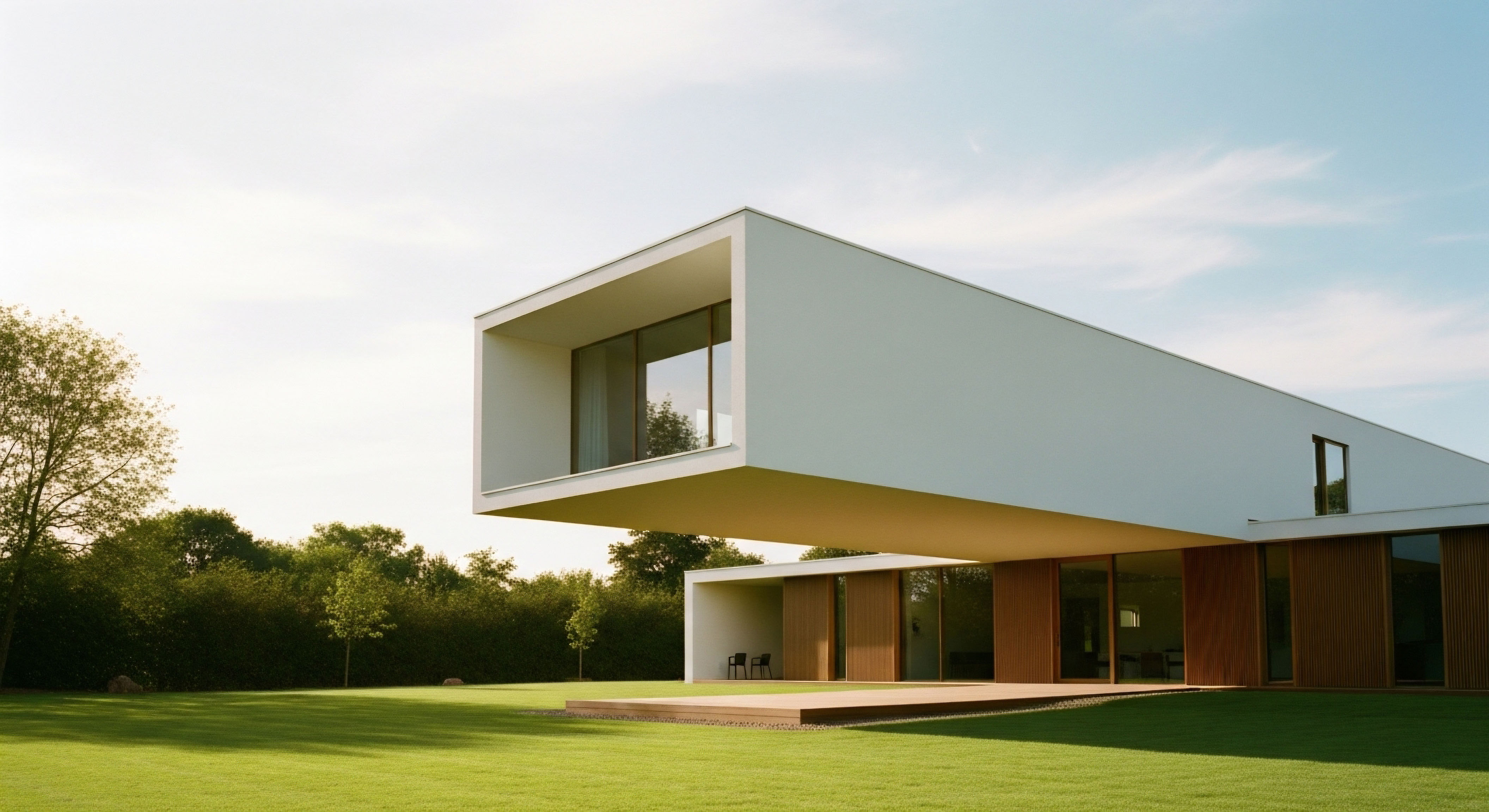

Why Your Sleep Dogma Is a Performance Anchor
You have been told a simple story ∞ eight hours of uninterrupted sleep is the gold standard for health, recovery, and performance. This clean, easily digestible number has become an article of faith in the wellness world. Yet, for those operating at the highest levels of cognitive and physical output, this rigid prescription is a blunt instrument.
It is a relic from an era that lacked the sophisticated tools to measure what truly matters. Adherence to this dogma, this one-size-fits-all mandate, is the very anchor holding you back from your biological potential. The conversation is no longer about the quantity of hours spent in bed. The real determinant of your edge is the quality and architecture of your sleep, calibrated with precision to your unique genetic wiring and daily demands.
The body is not a simple machine that powers down and powers up. It is a complex, adaptive system that runs on intricate cycles of repair, consolidation, and hormonal regulation. Each phase of sleep performs a distinct, critical function.
Deep sleep is when your body physically rebuilds, flooding your system with growth hormone to repair muscle tissue broken down by intense training. The subsequent REM stages are when your brain runs its optimization protocols, consolidating memory, pruning irrelevant neural pathways, and solidifying learned skills.
Forcing this sophisticated process into a generic eight-hour box is like running a high-performance engine on a single, unvarying gear. You are generating activity, but you are sacrificing efficiency, power, and the nuanced performance that separates the elite from the merely competent.
True optimization begins with a fundamental shift in perspective. You must move from a mindset of passive rest to one of active recovery management. This means understanding that your chronotype ∞ your innate predisposition to be a morning person, an evening person, or something in between ∞ is a non-negotiable biological reality.
Fighting this genetic blueprint by forcing an early wake-up time when you are a natural night owl, for instance, creates a state of chronic circadian stress. This misalignment disrupts the delicate hormonal symphony that governs your energy, mood, and metabolism.
The fatigue, brain fog, and performance plateaus you experience are not signals of insufficient sleep duration; they are data points indicating a system that is out of sync. Your edge is found in working with your biology, not in a futile war against it.
Sleep quality is a superior metric to sleep quantity because the amount of sleep you get each night is only one indicator of sleep health, whereas sleep quality is made up of several factors.
The pursuit of peak performance demands a more granular, more intelligent approach. It requires you to see sleep not as a daily obligation to be checked off, but as the most powerful performance-enhancing tool you possess. The question is not “Did I get my eight hours?” The questions are “Did I get the right kind of sleep for my needs?
Was my sleep architecture optimized for my goals? Am I aligning my rest with my genetic code?” Answering these questions unlocks a new frontier of personal performance. It is time to cut the anchor of outdated dogma and architect a recovery protocol as unique and ambitious as you are.


The Architecture of Elite Recovery
To move beyond the crude metric of hours slept is to become the architect of your own recovery. This process requires a foundational understanding of the materials you are working with ∞ sleep cycles, chronobiology, and the powerful hormonal tides that sleep governs.
Think of your nightly rest not as a single event, but as a meticulously orchestrated construction project with several critical phases. Each ninety-minute sleep cycle is a unit of work, progressing from light sleep to deep slow-wave sleep (SWS) and finally to Rapid Eye Movement (REM) sleep. Each phase has a non-negotiable role in building a high-performance human.
The initial stages are the groundwork. As you drift into light sleep, your body begins to power down. Then comes the critical phase ∞ deep SWS. This is where the physical restoration happens. During SWS, your brain gives the command to release a surge of human growth hormone (HGH).
This is the master signal for cellular repair, muscle growth, and bone strengthening. For an athlete or anyone pushing their physical limits, maximizing time in this stage is paramount for recovery and adaptation. Following this physical renovation, the project moves to the neurological and cognitive wiring during REM sleep.
Here, your brain is highly active, consolidating memories, refining motor patterns, and processing emotional data. A tennis player’s serve improves after sufficient sleep not just because their muscles are repaired, but because their brain has solidified the neural blueprint of the perfect motion during REM.

Understanding Your Biological Blueprint
The timing of these construction phases is dictated by your personal biological blueprint, your chronotype. Research clearly demonstrates that an individual’s preference for morning or evening activity is a deeply ingrained genetic trait that has a significant impact on cognitive function throughout the day.
Forcing an evening chronotype (a “wolf”) onto a 5 AM schedule is a recipe for suboptimal performance. Their cognitive peak occurs later in the day, and an early start truncates their most vital sleep phases, leaving them with incomplete physical and mental recovery.
Conversely, a morning chronotype (a “lion”) thrives with an early start and will see their performance decline if they try to conform to a late-night culture. The first step in building your elite recovery architecture is to identify and honor your chronotype. This alignment is the foundation upon which all other optimizations are built.

The Biphasic Advantage
With the foundation of chronotype alignment in place, you can begin to employ more sophisticated architectural techniques. One of the most powerful is biphasic sleep, a pattern that involves two distinct sleep periods within a 24-hour cycle. This is not a modern invention; historical records show it was a common practice before the industrial revolution rigidified the workday.
A biphasic schedule typically involves a shorter core sleep at night (perhaps 5-6 hours) supplemented by a strategic nap in the afternoon. This nap is not a sign of weakness; it is a precision tool for rebooting the system. A short power nap of 20-30 minutes can dramatically boost alertness and energy.
A longer, 90-minute nap allows for a full sleep cycle, providing both deep SWS for physical recovery and REM sleep for a cognitive reset. This “second wind” can create another peak performance window in the late afternoon, a time when monophasic sleepers often experience a significant slump.
Research shows children who follow biphasic sleep (one long nap and overnight sleep) have improved learning abilities because taking a nap helps the brain consolidate information and memories during sleep.
This approach transforms the day from a single, depleting marathon into two focused sprints. It provides a structured opportunity for the body and brain to clear metabolic waste, rebalance hormones like cortisol, and prepare for the next block of high-level output. The result is sustained cognitive function, better physical performance, and enhanced stress resilience.

Your Protocol for Sleep Architecture
Building your personalized sleep protocol is an iterative process of data collection, experimentation, and refinement. It requires you to become an active participant in your recovery.
-
Phase 1 ∞ Data Acquisition (Weeks 1-2)
Your first task is to gather baseline data. Utilize a wearable sleep tracker to monitor your current patterns. Pay attention to total sleep time, time spent in each sleep stage (Deep, REM, Light), and your wake-up times. Concurrently, keep a simple performance journal. Rate your morning energy, afternoon focus, and workout quality on a scale of 1-10. The goal is to correlate your subjective feelings of performance with objective sleep data. -
Phase 2 ∞ Chronotype Alignment (Weeks 3-4)
Analyze your data to identify your natural rhythm. When do you feel most alert? When does your energy naturally dip? Adjust your sleep and wake times to align with this pattern, even if it means shifting your schedule by an hour or two. For many, this simple act of synchronization yields immediate improvements in daily energy and performance. During this phase, continue to track your data and journal your subjective experience. -
Phase 3 ∞ Biphasic Experimentation (Weeks 5-6)
Once you are aligned with your chronotype, you can experiment with a biphasic schedule. Identify your typical afternoon energy slump (often between 1-3 PM). Schedule a strategic nap during this window. Start with a 20-minute power nap. Set an alarm to ensure you do not enter deep sleep, which can cause grogginess. After a week, assess the impact. If positive, you can experiment with a longer 90-minute nap on days with high physical or cognitive load to complete a full sleep cycle. -
Phase 4 ∞ Protocol Refinement (Ongoing)
Elite recovery is not static. It must adapt to your life’s demands. Use your data to understand how travel, intense training blocks, or high-stress projects impact your sleep architecture. A period of heavy physical training may require more core sleep to maximize deep SWS. A week of intense learning or creative work might benefit from longer naps to facilitate memory consolidation during REM. Your sleep protocol becomes a dynamic system that you actively manage to meet specific performance goals.
This structured approach moves you from a passive recipient of sleep to an active director of your recovery. You are no longer hoping for a good night’s rest; you are engineering it. You are building a system designed for one purpose ∞ to give you an undeniable edge in everything you do.


Calibrating Your New Nocturnal Protocol
The transition from a rigid eight-hour mandate to a personalized sleep architecture is a strategic process. The impetus to begin this calibration often arises from a clear signal ∞ a plateau in performance. You might notice your strength gains in the gym have stalled, your focus wavers during critical afternoon meetings, or your creative output feels muted.
These are not signs of failure; they are data points indicating that your current recovery protocol is insufficient for your level of ambition. The moment you recognize that your energy and output are inconsistent is the moment to begin the audit of your sleep.
The initial phase of this recalibration, typically the first one to two weeks, is focused on awareness. This is when you will notice the immediate effects of aligning your sleep schedule with your natural chronotype.
For an evening type who stops forcing a 5 AM wake-up, the first tangible result is often a dramatic reduction in morning grogginess and a greater sense of clarity throughout the day. For a morning type who shifts their bedtime earlier, the payoff is sustained energy through the afternoon, replacing the typical crash.
You will start to feel the difference between waking up because an alarm shocked you out of deep sleep versus waking up naturally at the end of a sleep cycle. This initial shift provides the first taste of what optimized rest feels like, building momentum for further refinement.

The Emergence of Tangible Results
Within three to four weeks of implementing a more structured protocol, the benefits will begin to compound and become measurable. This is when the data from your wearable tracker starts to tell a compelling story. You may see a consistent increase in the percentage of deep sleep after intense workout days, a direct indicator of enhanced physical recovery.
Your reaction time in sports, your accuracy on detail-oriented tasks, and your ability to solve complex problems will show noticeable improvement. Studies on athletes have demonstrated that extending sleep and aligning it with performance needs leads to faster sprint times, better accuracy, and quicker reaction times. You are experiencing the real-world consequence of providing your brain and body with the precise type of recovery they need.

Mastering the Long Game
After six to eight weeks, your personalized sleep protocol becomes second nature. This is the point of mastery. You will have developed an intuitive understanding of your own biology. You will know when a 20-minute power nap is sufficient to reclaim your afternoon and when a full 90-minute cycle is required to recover from a demanding day.
You will learn to proactively adjust your sleep schedule ahead of known stressors, like a long-haul flight or a major presentation, to pre-emptively bank recovery. Sleep is no longer a passive activity but an active, adjustable tool in your performance arsenal.
The ultimate payoff is not just improved daily performance but enhanced long-term vitality. Consistently optimized sleep has a profound impact on hormonal balance, regulating everything from cortisol and stress levels to testosterone and growth hormone, which are fundamental to maintaining muscle mass, cognitive sharpness, and a lean physique as you age.
This is the long-term dividend of investing in a sophisticated sleep architecture ∞ you are not just winning the day; you are engineering a more vibrant and resilient future.

Sleep Is a Tool You Must Learn to Wield
The acceptance of a generic, eight-hour sleep rule is an act of surrendering your biological sovereignty. It is an admission that your personal recovery needs are identical to the masses. For the individual committed to living at the peak of their potential, this is an unacceptable compromise.
The journey into the architecture of your own sleep is the final frontier of personal optimization. It is the deliberate choice to transform a passive, unconscious state into the most potent, actively managed performance enhancer you possess. This is not about sleeping less; it is about sleeping with intelligence, precision, and purpose. The blueprint for your ultimate edge is waiting to be drafted, and it is written in the language of your own unique rhythms.

Glossary

hormonal regulation

growth hormone

deep sleep

chronotype

sleep architecture

sleep cycles

sleep cycle

rem sleep

elite recovery

biphasic sleep

your personalized sleep protocol




